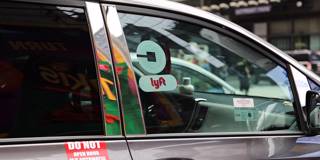A recent California law stops platform companies like Uber, Lyft, and DoorDash from misclassifying their more than 400,000 drivers as independent contractors, rather than employees. It is an important first step toward protecting workers in a labor market that is increasing their economic insecurity.
BERKELEY – In the United States and other advanced industrial economies, a growing number of workers no longer work for a single employer on a traditional contract. Instead, they earn income through a variety of “non-standard” working arrangements, including work mediated by digital platforms, or so-called gig work.
The distinction between an employee and a gig worker is not inconsequential. Under current laws, employees have rights and access to significant protections and benefits not provided to gig workers. A critical question now confronting policymakers is whether gig workers should be classified as independent contractors or as employees of the platform companies with which they have employment contracts and for whose customers they provide services.
California, a US state with more than two million independent contractors, has attempted to resolve this question with a new law, California Assembly Bill 5, which codifies the legal criteria for determining how to categorize workers. Applying the three-part “ABC test” that many states already use to determine whether a worker is eligible for unemployment insurance, AB5 makes it considerably harder for businesses to classify their workers as independent contractors rather than employees.

BERKELEY – In the United States and other advanced industrial economies, a growing number of workers no longer work for a single employer on a traditional contract. Instead, they earn income through a variety of “non-standard” working arrangements, including work mediated by digital platforms, or so-called gig work.
The distinction between an employee and a gig worker is not inconsequential. Under current laws, employees have rights and access to significant protections and benefits not provided to gig workers. A critical question now confronting policymakers is whether gig workers should be classified as independent contractors or as employees of the platform companies with which they have employment contracts and for whose customers they provide services.
California, a US state with more than two million independent contractors, has attempted to resolve this question with a new law, California Assembly Bill 5, which codifies the legal criteria for determining how to categorize workers. Applying the three-part “ABC test” that many states already use to determine whether a worker is eligible for unemployment insurance, AB5 makes it considerably harder for businesses to classify their workers as independent contractors rather than employees.